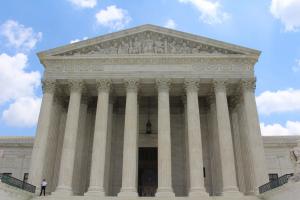
Progressives are understandably in mourning due to the confirmation yesterday of Amy Coney Barrett as an associate justice of the Supreme Court. I have mixed feelings about the confirmation myself. I will shed no tears if she votes to overturn Roe v. Wade, which I think is a badly argued decision and a serious obstacle in the path of any just and reasonable resolution of the abortion controversy. (I also am under no illusions that reversing Roe is a panacea, and I’m fairly skeptical that it will happen anyway.) I am deeply concerned about her record on immigration, which an expert on the subject of my acquaintance called “beyond appalling.” And I expect that any Trump appointee is likely to uphold the power of the big corporations and the increasingly lawless “imperial Presidency,” and in general facilitate rather than hinder the degeneration of the Republic in which I live into a crony-capitalist dystopia.
Focused on the wrong threat
But most people who bewail her nomination seem focused, instead, on what I regard as a largely illusory threat: the idea that she is the tool of a theocratic “cult” and will impose her twisted version of Catholic dogma on the country using the power of the Court.
In the first place, I deeply dislike the term “cult.” It can mean a lot of things, some of them legitimately useful. But mostly it’s just a socially acceptable way of saying “a religious group I don’t like.” Barrett is a member of (or at least has some kind of long-term association with) a charismatic Catholic group called the “People of Praise.” They appear to hold to a view of gender roles that is very common among conservative evangelicals but no longer typical among Catholics. Many of Barrett’s critics suppose that this means that her husband is probably calling the shots and use this to discredit the legitimacy of her appointment. I think this is plainly ridiculous. Barrett is a free citizen of the United States. If she wants to obey her husband, she is free to do so. There’s no evidence I know of that she has ever listened to him in any way that has compromised her legal judgment. It’s a fantasy criticism that actually distracts from real criticisms based on her record.
Many of the claims made about Barrett appear to be simply false. In a Facebook conversation today, I was told that she had said that women shouldn’t be able to buy or sell property without permission from their husbands. And furthermore, according to my interlocutor, I was like a flat-earth advocate for refusing to accept such irrefutable facts. Never mind that the person making these claims didn’t provide any source for them, while I was easily able to find refutations of the claim about buying and selling on both Snopes and Politifact.
Barrett’s entirely boilerplate and innocuous exhortation to Catholic legal students to go out and build the Kingdom of God is, according to these accusers, evidence that she’s engaged in some kind of nefarious theocratic plot.
Religion and politics
This isn’t just an overheated reaction to one problematic candidate in a highly charged election season. It’s an expression of the conviction held by many people in this country that “religion and politics don’t mix.” Somehow, religious candidates are supposed to keep their deepest convictions separate from their political actions.
I’ve never really understood how this is supposed to work. If you believe the universe is created by God and God is the source of all goodness and truth, and has revealed himself to the world, then that has implications for everything, including politics. To suggest otherwise is to demand that religious people become practical atheists in the “public square.” It punishes people of integrity and rewards hypocrisy and cognitive dissonance (such as the absurd claim by pro-choice Catholic politicians that they believe human personhood begins at conception but couldn’t possibly think of trying to protect those persons legally because their belief is “religious”).
Now of course, if you actually catch someone making an illegal or otherwise bad political action based on their religion, you have every reason to criticize them. And then you can point to their religion as a reason for their position. But it isn’t extra and specially bad because of its religious motivation. It’s bad for the same reasons the same action would be bad if carried out for a secular motivation.
That is what religious freedom ought to look like. We should judge the actions of public figures, not their religious affiliations per se. And we should judge their actions based on their goodness and justice and conformity with law. Our interpretations of these things (yes, even of what the law says) will inevitably be shaped by our own deepest convictions, whether traditionally “religious” or not.
Conservative “secularism”
Conservatives like to claim the high ground on this issue. But that’s bunk. Conservatives launched a vicious and unjustified attack on then-Senator Obama during the 2008 campaign because of Obama’s membership in Trinity United Church of Christ in Chicago. The church’s pastor, Jeremiah Wright, had issued scathing (and to my mind largely justified) denunciations of America which patriotic Republican Christians found to be horrifying. They used this, ruthlessly, to try to prove that Obama didn’t really love America in his heart. They violated his religious freedom in so doing. And of course the more radical right-wing critics of Obama compounded the irony by accusing him of really being a Muslim. First you attack the man for belonging to a Christian church, and then you claim he really belongs to another religion entirely. It was rationally incoherent and morally evil.
Muslims are the targets of this kind of critique even more than Christians. In the U.S., it’s mostly the right wing that attacks Muslims. A conservative friend of mine recently shared an article attacking the Colorado state congressional candidate Iman Jodeh for having been allegedly the spokesperson for a local mosque one of whose imams had made anti-gay remarks and called for harsh punishments for sexual offenders. Along with a host of other biased assumptions and innuendos, the author assumed that Jodeh’s position as spokesperson implied agreement with everything the imam had said, and ignored the very likely possibility that she belonged to this particular mosque because it was the only one in her area. The same friend who shared this article has accused Ilhan Omar of failing to support the Constitution, probably because of a remark she made about “tearing down the system of oppression” which was (rather tellingly) interpreted by right-wing critics as a statement of opposition to the Constitution.
Conservatives regularly attack Muslims for allegedly believing that it’s more important to be Islamic than to be American. Which raises the question, since most of these critics are Christians: why on earth don’t they believe the same thing about their own religion? Conservatives, in fact, have their own version of “secularism” in which, for instance, Christian teaching about welcoming the stranger should have no impact on government policy toward immigrants. They want Christian values to be dominant, but only some Christian values.
Religious freedom or Christian dominance?
On both sides, Americans regularly attack people whose politics they don’t like by attacking their religion, suggesting that the opponents somehow fail to maintain the proper distance between their faith and their politics. Progressives have by far the more consistent position here in principle, though they do sometimes turn a blind eye to views held by Muslims that they would recoil from in horror if professed by Christians, and they routinely fail to see that progressive heroes like MLK completely blurred the lines between politics and religion that contemporary progressives claim to hold so dear. (When I challenge progressives on this, they sometimes tell me that civil rights is different because it’s something that people can support for secular reasons. Whereas, many of them claim–mistakenly–abortion for instance is a purely religious issue.)
Conservatives, on the other hand, claim to have a robust understanding of religious liberty that allows for the public expression of religion and advocacy for positions rooted in the values of one’s faith. And yet they routinely, and shamefully, fail to give that freedom to Muslims and to others whose ideas they find abhorrent. “Religious freedom” really means “Christian dominance.”
It’s religion all the way down
I suggest that the fundamental problem here is the fallacious way in which the Enlightenment tradition has led Americans (and many other Westerners) to think about religion in the first place, as something layered on top of more obvious ethical considerations. (Of course, for most of the “Founding Fathers” those ethical considerations were “religious” too in the sense of being rooted in natural law as established eternally by God, but not tied to the dictates of a particular religious group.) If postmodernism has taught us anything, it should be that this is an illusion. We are all shaped by particular traditions, particular narratives, that cause us to ask particular questions and be open to particular answers.
Come as you are
Instead of trying to find some neutral, secular ground, we should be able to come into the “public square” with everything we are, seeking common ground by listening to one another and emphasizing the values we do have in common. Of course political conflict is sometimes necessary–not everything can be solved through compromise. Sometimes people really do entrench themselves in defense of evils that must be destroyed. Some people really are bent on dominating through force and persecuting and oppressing those with whom they disagree. But when that happens, spluttering that the other side isn’t playing by our rules is going to do us no good at all anyway. The real theocrats are not going to listen to people saying that they shouldn’t bring their religion into the public square. The only effect of this rhetoric is to silence moderates and force conservatives into more and more extreme positions.
So God bless Amy Coney Barrett. I hope she turns out to be a good and just judge who frustrates the designs of the corrupt demagogue who appointed her and the vengeful ideologues who cheer on her appointment. I hope the dogma lives loudly in her. The whole dogma, the dogma of social justice and respect for life both in and out of the womb, the dogma that God became man and was broken on the Cross to restore all humanity to its proper dignity. I hope that this dogma leads her to do justice to the poor and the oppressed, to refugees and immigrants, to the broken and the weak.
And if she doesn’t do these things, God will judge her.












